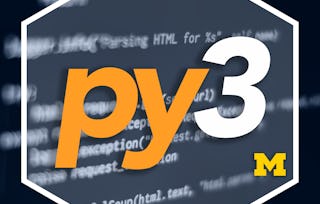This course (The English copy of "用Python玩转数据" <https://www.coursera.org/learn/hipython/home/welcome>) is mainly for non-computer majors. It starts with the basic syntax of Python, to how to acquire data in Python locally and from network, to how to present data, then to how to conduct basic and advanced statistic analysis and visualization of data, and finally to how to design a simple GUI to present and process data, advancing level by level.

Data Processing Using Python

378 reviews
Skills you'll gain
Details to know

Add to your LinkedIn profile
8 assignments
See how employees at top companies are mastering in-demand skills

There are 6 modules in this course
Hi, guys, welcome to learn “Data Processing Using Python”(The English version of "用Python玩转数据", url is https://www.coursera.org/learn/hipython/home/welcome)!In this course, I tell in a manner that enables non-computer majors to understand how to utilize this simple and easy programming language – Python to rapidly acquire, express, analyze and present data based on SciPy, Requests, Beautiful Soup libraries etc. Many cases are provided to enable you to easily and happily learn how to use Python to process data in many fields.
What's included
1 video2 readings
Hi, guys, welcome to learn Module 01 “Basics of Python”! I’ll first guide you to have a glimpse of its simplicity for learning as well as elegance and robustness. Less is more: the author of Python must know this idea well. After learning this module, you can master the basic language structures, data types, basic operations, conditions, loops, functions and modules in Python. With them, we can write some useful programs!
What's included
16 videos7 readings2 assignments1 programming assignment1 discussion prompt
Welcome to learn Module 02 “Data Acquisition and Presentation”! After learning this module, you can master the modes of acquiring local data and network data in Python and use the basic and yet very powerful data structure sequence, string, list and tuple in Python to fast and effectively present data and simply process data.
What's included
10 videos5 readings1 assignment1 discussion prompt
Welcome to learn Module 03 “Powerful Data Structures and Python Extension Libraries”! Have you felt you are closer to using Python to process data? After learning this module, you can master the intermediate-level and advanced uses of Python: data structure dictionaries and sets. In some applications, they can be very convenient. What’s special here is that, you can also feel the charm of such concise and efficient data structures: ndarray, Series and DataFrame in the most famous and widely applied scientific computing package SciPy in Python.
What's included
9 videos7 readings1 assignment1 discussion prompt
Welcome to learn Module 04 “Python data statistics and mining”! In this module, I will show you, over the entire process of data processing, the unique advantages of Python in data processing and analysis, and use many cases familiar to and loved by us to learn about and master methods and characteristics. After learning this module, you can preprocess the data and fast and effectively mine your desired or expected or unknown results from a large amount of data, and can also present those data in various images. In addition, the data statistics modes of all third party packages in Python are extraordinarily and surprisingly strong, but we, as average persons, can still understand and possess them.
What's included
13 videos19 readings2 assignments1 programming assignment
Welcome to Module 05 “Object Orientation and Graphical User Interface”! In this module, I will guide you to understand what object orientation is and the relationship between graphical user interface and object orientation. Learners are only required to understand the concepts so that you can more freely and easily pick up various new functions in future. No program writing is required here. Besides, you also need to master the basic framework of GUI, common components and layout management. After learning them, you will find development with GUI is actually not remote.
What's included
8 videos5 readings2 assignments
Instructor

Offered by
Explore more from Software Development
 Status: Free Trial
Status: Free Trial Status: Free Trial
Status: Free TrialUniversity of Michigan
 Status: Free Trial
Status: Free TrialGoogle
Why people choose Coursera for their career

Felipe M.

Jennifer J.

Larry W.

Chaitanya A.
Learner reviews
- 5 stars
60.58%
- 4 stars
17.98%
- 3 stars
6.61%
- 2 stars
2.91%
- 1 star
11.90%
Showing 3 of 378
Reviewed on Jun 5, 2018
Very nice course. Could be extended to 12 weeks with more detailed coverage of packages. Please upload English audio tracks.
Reviewed on Sep 11, 2017
It's a basic Python lesson, but providing some data analysis and GUI concepts, which needs you to explore after this class or in the future.
Reviewed on Jan 3, 2024
Great course for data analysis, processing, and representation.

Open new doors with Coursera Plus
Unlimited access to 10,000+ world-class courses, hands-on projects, and job-ready certificate programs - all included in your subscription
Advance your career with an online degree
Earn a degree from world-class universities - 100% online
Join over 3,400 global companies that choose Coursera for Business
Upskill your employees to excel in the digital economy
Frequently asked questions
To access the course materials, assignments and to earn a Certificate, you will need to purchase the Certificate experience when you enroll in a course. You can try a Free Trial instead, or apply for Financial Aid. The course may offer 'Full Course, No Certificate' instead. This option lets you see all course materials, submit required assessments, and get a final grade. This also means that you will not be able to purchase a Certificate experience.
When you purchase a Certificate you get access to all course materials, including graded assignments. Upon completing the course, your electronic Certificate will be added to your Accomplishments page - from there, you can print your Certificate or add it to your LinkedIn profile.
Yes. In select learning programs, you can apply for financial aid or a scholarship if you can’t afford the enrollment fee. If fin aid or scholarship is available for your learning program selection, you’ll find a link to apply on the description page.
More questions
Financial aid available,


